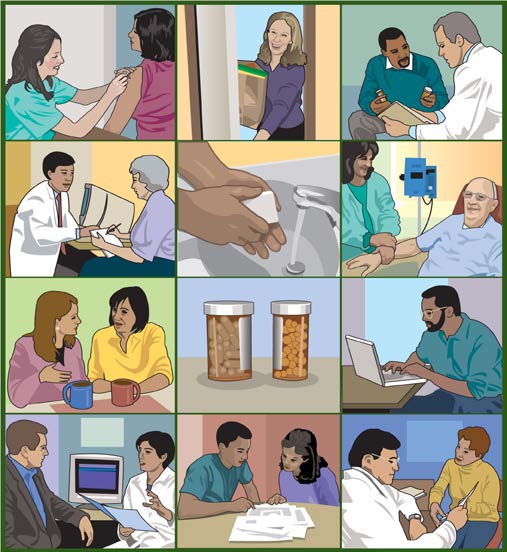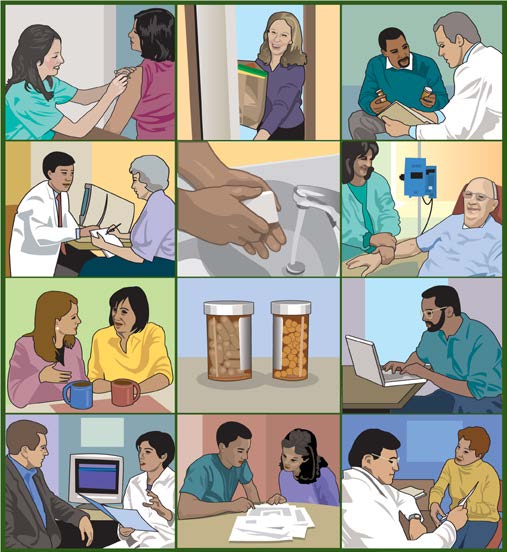
Support for People With Cancer
Chemotherapy
and You
National Cancer Institute
U.S. DEPARTMENT
OF HEALTH AND
HUMAN SERVICES
National Institutes
of Health


Important Phone Numbers
Emergency ____________________________________________
Clinic ________________________________________________
Nurse ________________________________________________
Doctor _______________________________________________
Other ________________________________________________
_____________________________________________________
For More Information
This is only one of many free books for people with cancer.
Here are some others you may find useful:
■
■ Biological Therapy
■
■ Radiation Therapy and You: Support for People With Cancer
■
■ Eating Hints: Before, During, and After Cancer Treatment
■
■ Taking Part in Cancer Treatment Research Studies
■
■ Thinking About Complementary & Alternative Medicine:
A Guide for People With Cancer
■
■ Pain Control: A Guide for People With Cancer
■
■ When Cancer Returns
■
■ Taking Time: Support for People with Cancer
These books are available from NCI (the National Cancer Institute). NCI is a federal agency that is part of the National Institutes of Health. Call 1-800-4-CANCER
(1-800-422-6237) or visit http://www.cancer.gov. (See page 59 for more information.)
*For information about your specific type of cancer, see the PDQ® database.
You can also find the database at http://www.cancer.gov.
Product or brand names that appear in this book are for example only. The U.S.
Government does not endorse any specific product or brand. If products or brands are not mentioned, it does not mean or imply that they are not satisfactory.
1-800-4-CANCER (1-800-422-6237)

About This Book
Rather than
Chemotherapy and You is written for you—someone who is about to read this book
receive or is now receiving chemotherapy for cancer. Your family, friends, and others close to you may also want to read this book.
from beginning
to end—
This book is a guide you can refer to throughout your chemotherapy treatment. It includes facts about chemotherapy and its side effects
look at only
and also highlights ways you can care for yourself before, during, and those sections
after treatment.
you need now.
This book covers:
Later, you
can always
■
■ Questions and answers about chemotherapy.
Answers common questions, such as what chemotherapy is
read more.
and how it affects cancer cel s.
■
■ Side effects and ways to manage them.
Explains side effects and other problems that may result from chemotherapy.
This section also has ways that you and your doctor or nurse can manage these side effects.
■
■ Tips for meeting with your doctor or nurse.
Includes questions for you to think about and discuss with your doctor, nurse, and others involved in your cancer care.
■
■ Ways to learn more.
Lists ways to get more information about chemotherapy and other topics discussed in this book—in print, online, and by telephone.
■
■ Words to know.
A dictionary that clearly explains all the words that are in bold in this book.
Talk with your doctor or nurse about what you can expect during chemotherapy.
He or she may suggest that you read certain sections of this book or try some of the ways to manage side effects.
www.cancer.gov







Table of Contents
Questions and Answers About Chemotherapy ............................ 1
Rather than
Tips for Meeting With Your Doctor or Nurse ............................. 10
read this book
Questions To Ask ......................................................................................10
from beginning
Your Feelings During Chemotherapy ............................................ 12
to end—
Side Effects and Ways To Manage Them....................................... 14
look at only
Side Effects At-A-Glance ..........................................................................15
those sections
Anemia .......................................................................................................16
Appetite Changes ......................................................................................18
you need now.
Bleeding ......................................................................................................20
Later, you
Constipation ..............................................................................................22
can always
Diarrhea ......................................................................................................24
read more.
Fatigue.........................................................................................................26
Hair Loss .....................................................................................................28
Infection ....................................................................................................30
Infertility .....................................................................................................33
Mouth and Throat Changes .....................................................................35
Nausea and Vomiting................................................................................38
Nervous System Changes .........................................................................40
Pain..............................................................................................................42
Sexual Changes ..........................................................................................44
Skin and Nail Changes ..............................................................................47
Urinary, Kidney, and Bladder Changes ..................................................50
Other Side Effects ......................................................................................51
Foods To Help With Side Effects ..................................................... 52
Clear Liquids ..............................................................................................52
Liquid Foods ..............................................................................................53
Foods and Drinks That Are High in Calories or Protein .....................54
High-Fiber Foods ......................................................................................55
Low-Fiber Foods .......................................................................................56
Foods That Are Easy on a Sore Mouth ...................................................57
Foods and Drinks That Are Easy on the Stomach ................................58
Ways To Learn More ........................................................................... 59
Words To Know ................................................................................... 60
www.cancer.gov



Questions and Answers About Chemotherapy
What is
Chemotherapy (also called chemo) is a type of cancer treatment
chemotherapy?
that uses drugs to destroy cancer cel s.
How does
Chemotherapy works by stopping or slowing the growth of
chemotherapy
cancer cel s, which grow and divide quickly. But it can also harm work?
healthy cells that divide quickly, such as those that line your mouth and intestines or cause your hair to grow. Damage to
healthy cel s may cause side effects. Often, side effects get better or go away after chemotherapy is over.
What does
Depending on your type of cancer and how advanced it is,
chemotherapy do?
chemotherapy can:
■■ Cure cancer—when chemotherapy destroys cancer cel s to
the point that your doctor can no longer detect them in your
body and they will not grow back.
■■ Control cancer—when chemotherapy keeps cancer from
spreading, slows its growth, or destroys cancer cel s that have
spread to other parts of your body.
■
■ Ease cancer symptoms (also called palliative care)—when chemotherapy shrinks tumors that are causing pain or
pressure.
How is
Sometimes, chemotherapy is used as the only cancer treatment.
chemotherapy
But more often, you will get chemotherapy along with surgery,
used?
radiation therapy, or biological therapy. Chemotherapy can:
■■ Make a tumor smaller before surgery or radiation therapy.
This is called neo-adjuvant chemotherapy.
■■ Destroy cancer cel s that may remain after surgery or
radiation therapy. This is called adjuvant chemotherapy.
■■ Help radiation therapy and biological therapy work better.
■■ Destroy cancer cel s that have come back (recurrent cancer) or spread to other parts of your body (metastatic cancer).
www.cancer.gov
1
How does
This choice depends on:
my doctor
decide which
■■ The type of cancer you have. Some types of chemotherapy
chemotherapy
drugs are used for many types of cancer. Other drugs are used
drugs to use?
for just one or two types of cancer.
■■ Whether you have had chemotherapy before.
■■ Whether you have other health problems, such as diabetes or
heart disease.
Where do I go for
You may receive chemotherapy during a hospital stay, at home, or
chemotherapy?
in a doctor’s office, clinic, or outpatient unit in a hospital (which means you do not have to stay overnight). No matter where you
go for chemotherapy, your doctor and nurse will watch for side
effects and make any needed drug changes.
How often
Treatment schedules for chemotherapy vary widely. How often
will I receive
and how long you get chemotherapy depends on:
chemotherapy?
■■ Your type of cancer and how advanced it is
■■ The goals of treatment (whether chemotherapy is used to cure
your cancer, control its growth, or ease the symptoms)
■■ The type of chemotherapy
■■ How your body reacts to chemotherapy
You may receive chemotherapy in cycles. A cycle is a period
of chemotherapy treatment followed by a period of rest. For
instance, you might receive 1 week of chemotherapy followed by
3 weeks of rest. These 4 weeks make up one cycle. The rest period gives your body a chance to build new healthy cel s.
Can I miss a dose
It is not good to skip a chemotherapy treatment. But sometimes
of chemotherapy?
your doctor or nurse may change your chemotherapy schedule.
This can be due to side effects you are having. If this happens,
your doctor or nurse will explain what to do and when to start
treatment again.
2
1-800-4-CANCER (1-800-422-6237)
How is
Chemotherapy may be given in many ways.
chemotherapy
given?
■■ Injection. The chemotherapy is given by a shot in a muscle in your arm, thigh, or hip, or right under the skin in the fatty
part of your arm, leg, or bel y.
■■ Intra-arterial (IA). The chemotherapy goes directly into the artery that is feeding the cancer.
■■ Intraperitoneal (IP). The chemotherapy goes directly into the peritoneal cavity (the area that contains organs such as your intestines, stomach, liver, and ovaries).
■
■ Intravenous (IV). The chemotherapy goes directly into a vein.
■■ Topical. The chemotherapy comes in a cream that you rub onto your skin.
■■ Oral. The chemotherapy comes in pil s, capsules, or liquids that you swallow.
www.cancer.gov
3

Things to know about getting chemotherapy through an IV
Chemotherapy is often given through a thin needle that is placed in a vein on your hand or lower arm. Your nurse will put the needle in at the start of each treatment and remove it when treatment is over. Let your doctor or nurse know right away if you feel pain or burning while you are getting IV chemotherapy.
IV chemotherapy is often given through catheters or ports, sometimes with the help of a pump.
■
■ Catheters. A catheter is a soft, thin tube. A surgeon places one end of the catheter in a large vein, often in your chest area. The other end of the catheter stays outside your body. Most catheters stay in place until all your chemotherapy treatments are done. Catheters can also be used for drugs other than chemotherapy and to
draw blood. Be sure to watch for signs of infection around your catheter. For more
information on infection, see page 30.
■
■ Ports. A port is a smal , round disc made of plastic or metal that is placed under your skin. A catheter connects the port to a large vein, most often in your chest.
Your nurse can insert a needle into your port to give you
chemotherapy or draw blood. This needle can be left in place
for chemotherapy treatments that are given for more than 1
day. Be sure to watch for signs of infection around your port.
For more information on infection, see page 30.
■
■ Pumps. Pumps are often attached to catheters or ports. They control how much and how fast chemotherapy goes into a catheter or port. Pumps can be internal or external. External pumps remain outside your body. Most
people can carry these pumps with them. Internal pumps are
placed under your skin during surgery.
4
1-800-4-CANCER (1-800-422-6237)
How will I
Chemotherapy affects people in different ways. How you feel
feel during
depends on how healthy you are before treatment, your type of
chemotherapy?
cancer, how advanced it is, the kind of chemotherapy you are
getting, and the dose. Doctors and nurses cannot know for certain how you will feel during chemotherapy.
Some people do not feel well right after chemotherapy. The most
common side effect is fatigue, feeling exhausted and worn out.
You can prepare for fatigue by:
■
■ Asking someone to drive you to and from chemotherapy
■
■ Planning time to rest on the day of and day after
chemotherapy
■
■ Getting help with meals and childcare the day of and at least
1 day after chemotherapy
There are many ways you can help manage chemotherapy side
effects. For more information, see the Side Effects At-A-Glance
section starting on page 15.
Can I work
Many people can work during chemotherapy, as long as they
during
match their schedule to how they feel. Whether or not you can
chemotherapy?
work may depend on what kind of work you do. If your job
allows, you may want to see if you can work part-time or work
from home on days you do not feel wel .
Many employers are required by law to change your work
schedule to meet your needs during cancer treatment. Talk
with your employer about ways to adjust your work during
chemotherapy. You can learn more about these laws by talking
with a social worker.
www.cancer.gov
5

Can I take
This depends on the type of chemotherapy you get and the other
over-the-counter
types of drugs you plan to take. Take only drugs that are approved and prescription
by your doctor or nurse. Tell your doctor or nurse about all the
drugs while I get
over-the-counter and prescription drugs you take, including
chemotherapy?
laxatives, allergy medicines, cold medicines, pain relievers,
aspirin, and ibuprofen.
One way to let your doctor or nurse know about these drugs is by
bringing in all your pill bottles. Your doctor or nurse needs
to know:
■
■ The name of each drug
■
■ The reason you take it
■
■ How much you take
■
■ How often you take it
Talk to your doctor or nurse before you
take any over-the-counter or prescription
drugs, vitamins, minerals, dietary
supplements, or herbs.
Can I take vitamins, Some of these products can change how chemotherapy works. For minerals, dietary
this reason, it is important to tell your doctor or nurse about all supplements,
the vitamins, minerals, dietary supplements, and herbs that you
or herbs while I get
take before you start chemotherapy. During chemotherapy, talk
chemotherapy?
with your doctor before you take any of these products.
How will I
Your doctor will give you physical exams and medical tests
know if my
(such as blood tests and x-rays). He or she will also ask you
chemotherapy
how you feel.
is working?
You cannot tell if chemotherapy is working based on its side
effects. Some people think that severe side effects mean that
chemotherapy is working wel , or that no side effects mean that
chemotherapy is not working. The truth is that side effects have
nothing to do with how well chemotherapy is fighting
your cancer.
6
1-800-4-CANCER (1-800-422-6237)
How much does
It is hard to say how much chemotherapy will cost. It depends on: chemotherapy cost?
■
■ The types and doses of chemotherapy used
■
■ How long and how often chemotherapy is given
■
■ Whether you get chemotherapy at home, in a clinic or office,
or during a hospital stay
■
■ The part of the country where you live
Does my health
Talk with your health insurance company about what costs it will
insurance pay for
pay for. Questions to ask include:
chemotherapy?
■
■ What will my insurance pay for?
■
■ Do I need to call my insurance company before each
treatment for it to be covered? Or, does my doctor’s office
need to call?
■
■ What do I have to pay for?
■
■ Can I see any doctor I want or do I need to choose from a list
of preferred providers?
■
■ Do I need a written referral to see a specialist?
■
■ Is there a co-pay (money I have to pay) each time I have an



















